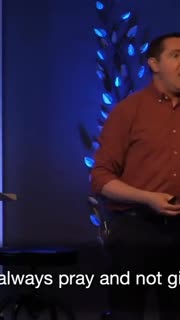Persistent Prayer: Trusting in God's Goodness
Devotional
Sermon Summary
Bible Study Guide
Sermon Clips
### Quotes for Outreach
1. "If you're not an especially religious person, if you ask a religious person about their prayer life, eventually you'll discover two things. One, most of them will say, I don't feel like I pray enough. And two, almost all of them will tell you if they're honest, I've been disappointed. Sometimes. It's been hard. Sometimes God hasn't given me the thing that I thought he should have wanted to give me. So prayer is kind of a complicated thing. And yet, here's what we see in the scriptures and for 2,000 years of church history. That when people who believe in Jesus pray, sometimes, not always, God does crazy things. Like crazy things. Things that no one could conjure up or invent or do in their own strength. That when God's people pray, God, in his mercy, hears those prayers. And says yes to them." [01:58] (46 seconds)
2. "Always pray. Never give up. What do you do when God's not answering these prayers that you think he should answer? What do you do when the prayers aren't being heard, doesn't feel like God's anywhere doing anything? You know what you do? Always pray. Never give up. What if you don't like praying? Merry Christmas. No one's asking you. No one cares if you like praying or not. That's not a question. You've got a tool, a gift. Always pray. Never give up." [06:27] (37 seconds)
3. "God did not give you a voice to sound like someone else's voice. God gave you your voice. That you might contribute your voice alongside everyone else's voices to go before the throne of God that his kingdom might come. His will might be done on earth as it is in heaven. What do you do if you don't feel like you sound like a good prayer? You don't feel like you know how to pray or say the right things. Or you don't have like the spiritual holy. The now voice that someone that you grew up with had. Always pray. Never, ever, ever give up." [07:10] (36 seconds)
4. "God is good. He hears the prayers of his children. He responds to the requests of his children. God is good. He does hear the cries. Move toward us. And that is the basis for relentless prayer. That is the basis for prevailing prayer. That is the basis for courageous prayer. That is the basis for always praying. And never ever ever giving up." [17:21] (32 seconds)
5. "If you're here today, you're not a praying person, like not a person of faith, not a Jesus person. We're so glad you're here. What if you gave God one week of praying and not giving up? As often as you might remember it, what if you said, okay, I'm going to give God one week. Well, I'm going to try my best just to be a person of prayer. I'm not even sure if God exists. I'm not even sure if this is real. I'm not sure. I'm not sure if God is even hearing this, but I'm willing to give this a shot." [29:46] (21 seconds)
### Quotes for Members
1. "Jesus is telling a parable to his disciples because there's going to be days when they don't want to pray. That's why he's telling them to keep praying, right? He's telling them to keep praying because there's going to be days when they don't feel like praying, just like there's days when you don't feel like praying. So what does it mean if you don't really like to pray that much, if you struggle to pray? You know what it means? It means you're normal. Merry Christmas. Always pray. Never give up." [05:52] (27 seconds)
2. "Last summer I had a sense from the Lord. That he was calling me to pray more. Like over the course of the summer. When I had a little bit more margin. And less kids running around. And that kind of thing. So I doubled my time in prayer. All summer long. From whatever my normal time would have been. To doubling that. So normally I'm about 30 plus minutes or so. In scripture and prayer. I spent an hour every summer morning. That I could. If I was on vacation. Off on a vacation. I was kind of like. I was kind of checked out. Like I was at least in prayer. For 15, 20 minutes. Every day. All summer long. Mostly an hour. It was one of the richest summers in prayer I'd ever had. It was really deep. And mostly I was praying. For Chatham County and Chatham Community Church. That God would give us more of his Holy Spirit." [09:25] (40 seconds)
3. "Here's how religious activity goes wrong. When we use religious stuff. Coming to church. Praying. To prop us up. That's when it goes wrong. Versus opening us up. That's when it's working rightly. When you use a religious activity. Look how much I pray. Look how much I go to church. I read the Bible. I do these things. I don't do these other things. All good stuff. When you use that as a prop. Or a set of badges. Or a scoreboard. To demonstrate. Here's how good I am. That's when religious self-righteousness creeps in. And there's nothing worse from the pit of hell. Than religious self-righteousness. Literally. It's what sent Jesus to the cross. That's how bad it can get. So religious self-righteousness. When it's used as a prop. To prop me up. That's when it goes wrong. But when I use religious practices. To open me up. Ha ha. That's when it's good." [11:09] (46 seconds)
4. "See, sometimes all we can do is cry out for God to do something that we can't do. God, would you heal this person who's sick or do a thing that I can't do. And yet, sometimes God is saying to you, I want you to be the answer to your own prayers. There. There have been times. Here's my true confession. There have been times when I've been praying, God, would you do this? Would you do this? Would you do this? And God says, I'm not answering that prayer. I want you to go do it. I want you to be the answer to your prayer. There have been times when I've been hiding behind prayer. Asking God to do a miracle when God's like, no, no, no, no, no. You take responsibility. I don't want to take the risk. God says, you take the risk. I'm going to go with you. I'm not abandoning you. But I'm not going to wave a magic wand and just fix something. That's your responsibility. That's your responsibility to go and fix." [26:20] (48 seconds)
5. "If God's not intervening, what is God teaching me about himself or doing in me? What's God showing me about his character or how is God wanting to shape my character? If God's not yet intervening, if God hasn't moved quickly, is God just asking me to keep persevering, be faithful, be steadfast, to continue to come and keep at it and keep at it and keep at it? Or is God wanting me to lift my head and say, hey, listen, you keep beating your head against this thing over here. I'm at work over there. Are you willing to look over there instead of just being so focused on this thing that you want me to do? Every so often, God's trying to redirect me, shape me, or give me a different picture, a bigger picture of who he is and what he's about." [28:30] (38 seconds)
Ask a question about this sermon
1. "If you're not an especially religious person, if you ask a religious person about their prayer life, eventually you'll discover two things. One, most of them will say, I don't feel like I pray enough. And two, almost all of them will tell you if they're honest, I've been disappointed. Sometimes. It's been hard. Sometimes God hasn't given me the thing that I thought he should have wanted to give me. So prayer is kind of a complicated thing. And yet, here's what we see in the scriptures and for 2,000 years of church history. That when people who believe in Jesus pray, sometimes, not always, God does crazy things. Like crazy things. Things that no one could conjure up or invent or do in their own strength. That when God's people pray, God, in his mercy, hears those prayers. And says yes to them." [01:58] (46 seconds)
2. "Always pray. Never give up. What do you do when God's not answering these prayers that you think he should answer? What do you do when the prayers aren't being heard, doesn't feel like God's anywhere doing anything? You know what you do? Always pray. Never give up. What if you don't like praying? Merry Christmas. No one's asking you. No one cares if you like praying or not. That's not a question. You've got a tool, a gift. Always pray. Never give up." [06:27] (37 seconds)
3. "God did not give you a voice to sound like someone else's voice. God gave you your voice. That you might contribute your voice alongside everyone else's voices to go before the throne of God that his kingdom might come. His will might be done on earth as it is in heaven. What do you do if you don't feel like you sound like a good prayer? You don't feel like you know how to pray or say the right things. Or you don't have like the spiritual holy. The now voice that someone that you grew up with had. Always pray. Never, ever, ever give up." [07:10] (36 seconds)
4. "God is good. He hears the prayers of his children. He responds to the requests of his children. God is good. He does hear the cries. Move toward us. And that is the basis for relentless prayer. That is the basis for prevailing prayer. That is the basis for courageous prayer. That is the basis for always praying. And never ever ever giving up." [17:21] (32 seconds)
5. "If you're here today, you're not a praying person, like not a person of faith, not a Jesus person. We're so glad you're here. What if you gave God one week of praying and not giving up? As often as you might remember it, what if you said, okay, I'm going to give God one week. Well, I'm going to try my best just to be a person of prayer. I'm not even sure if God exists. I'm not even sure if this is real. I'm not sure. I'm not sure if God is even hearing this, but I'm willing to give this a shot." [29:46] (21 seconds)
### Quotes for Members
1. "Jesus is telling a parable to his disciples because there's going to be days when they don't want to pray. That's why he's telling them to keep praying, right? He's telling them to keep praying because there's going to be days when they don't feel like praying, just like there's days when you don't feel like praying. So what does it mean if you don't really like to pray that much, if you struggle to pray? You know what it means? It means you're normal. Merry Christmas. Always pray. Never give up." [05:52] (27 seconds)
2. "Last summer I had a sense from the Lord. That he was calling me to pray more. Like over the course of the summer. When I had a little bit more margin. And less kids running around. And that kind of thing. So I doubled my time in prayer. All summer long. From whatever my normal time would have been. To doubling that. So normally I'm about 30 plus minutes or so. In scripture and prayer. I spent an hour every summer morning. That I could. If I was on vacation. Off on a vacation. I was kind of like. I was kind of checked out. Like I was at least in prayer. For 15, 20 minutes. Every day. All summer long. Mostly an hour. It was one of the richest summers in prayer I'd ever had. It was really deep. And mostly I was praying. For Chatham County and Chatham Community Church. That God would give us more of his Holy Spirit." [09:25] (40 seconds)
3. "Here's how religious activity goes wrong. When we use religious stuff. Coming to church. Praying. To prop us up. That's when it goes wrong. Versus opening us up. That's when it's working rightly. When you use a religious activity. Look how much I pray. Look how much I go to church. I read the Bible. I do these things. I don't do these other things. All good stuff. When you use that as a prop. Or a set of badges. Or a scoreboard. To demonstrate. Here's how good I am. That's when religious self-righteousness creeps in. And there's nothing worse from the pit of hell. Than religious self-righteousness. Literally. It's what sent Jesus to the cross. That's how bad it can get. So religious self-righteousness. When it's used as a prop. To prop me up. That's when it goes wrong. But when I use religious practices. To open me up. Ha ha. That's when it's good." [11:09] (46 seconds)
4. "See, sometimes all we can do is cry out for God to do something that we can't do. God, would you heal this person who's sick or do a thing that I can't do. And yet, sometimes God is saying to you, I want you to be the answer to your own prayers. There. There have been times. Here's my true confession. There have been times when I've been praying, God, would you do this? Would you do this? Would you do this? And God says, I'm not answering that prayer. I want you to go do it. I want you to be the answer to your prayer. There have been times when I've been hiding behind prayer. Asking God to do a miracle when God's like, no, no, no, no, no. You take responsibility. I don't want to take the risk. God says, you take the risk. I'm going to go with you. I'm not abandoning you. But I'm not going to wave a magic wand and just fix something. That's your responsibility. That's your responsibility to go and fix." [26:20] (48 seconds)
5. "If God's not intervening, what is God teaching me about himself or doing in me? What's God showing me about his character or how is God wanting to shape my character? If God's not yet intervening, if God hasn't moved quickly, is God just asking me to keep persevering, be faithful, be steadfast, to continue to come and keep at it and keep at it and keep at it? Or is God wanting me to lift my head and say, hey, listen, you keep beating your head against this thing over here. I'm at work over there. Are you willing to look over there instead of just being so focused on this thing that you want me to do? Every so often, God's trying to redirect me, shape me, or give me a different picture, a bigger picture of who he is and what he's about." [28:30] (38 seconds)










